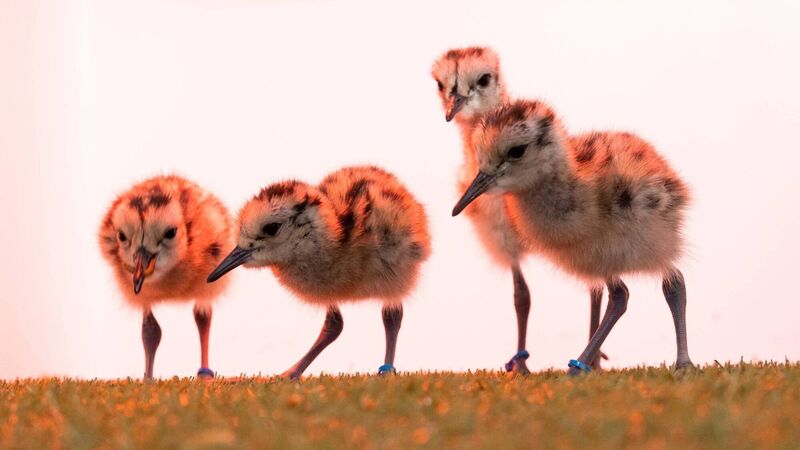A dozen critically endangered Eurasian curlew chicks hatch at Cork’s Fota Wildlife Park

Fota Wildlife Park has announced the arrival of 12 Eurasian curlew chicks, a critically endangered species. Photo: Darragh Kane
Fota Wildlife Park has announced the arrival of 12 Eurasian curlew chicks, a critically endangered species.
The chicks hatched at Fota from 31 viable eggs collected from the wild across various counties in Ireland, with more chicks expected to hatch in the coming weeks.
The arrival of the eggs at the park is part of a Breeding Waders European Innovation Partnership (EIP) programme.
Under this EIP programme, nest protection officers and project staff intensively survey areas of suitable habitat.
Once territorial breeding behaviour is established, the project personnel undertake long hours in the field in an attempt to locate nests.
The project has used both traditional nest finding techniques as well as innovative methods such as the use of thermal imagery drones.
These drone flights have been undertaken under licence from the National Parks and Wildlife Service by project partners, the Hen Harrier Programme.
Once located, the eggs are collected from the wild and sent to Fota Wildlife Park for incubation and rearing of the chicks to fledglings.
When capable of flying, the birds will be released back into their native habitats, providing them with protection against predators and other threats during the vulnerable early stages of life.
“The curlew, once a common sight in Ireland’s bogs and wetlands, is now critically endangered, having experienced a staggering 98% decline since the 1970s,” animal care manager at Fota, Declan O’Donovan, said.
“This alarming trend places the breeding curlew on the brink of extinction.
The €25m Breeding Waders EIP is funded jointly by the National Parks and Wildlife Service at the Department of Housing, Local Government and Heritage, and the Department of Agriculture, Food, and the Marine, under the European Innovation Partnership (EIP) Agri Programme.
Project manager for the Breeding Waders EIP, Owen Murphy, said the project is “delighted to be working collaboratively” with Fota Wildlife Park.
“It is worth noting that the project will only take first clutch eggs from the wild for headstarting and our nest protection officers and wader project officers maintain their vigilance in the field in order to offer the best protection possible to the second clutches, which are incubated and reared in the wild by the parent birds,” he added.







 App?
App?


